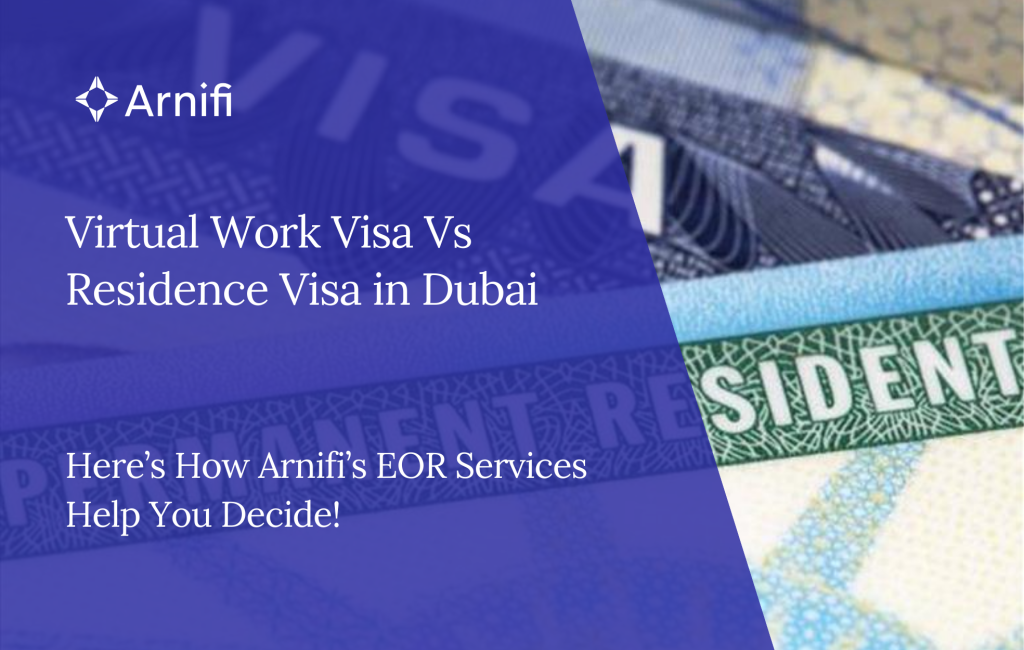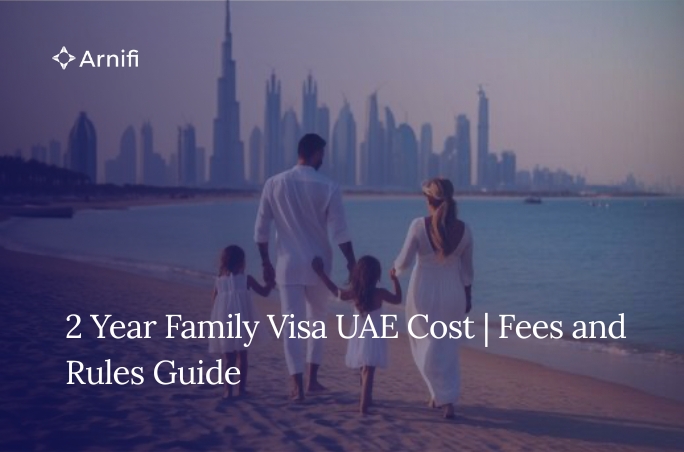Virtual Work Visa Vs Residence Visa in Dubai | How Arnifi’s EOR Services Help You Decide
by Shethana May 21, 2025  7 MIN READ
7 MIN READ

Dubai is amongst the most sought-after cities for professionals, entrepreneurs, and remote workers to relocate to. With its modern infrastructure, taxation benefits, and high standard of living, it provides the perfect lifestyle for any professional. A crucial decision comes about before you pack your bags to head for the UAE – Should you go for a Virtual Work Visa or a Residence Visa?
A little understanding of the difference between the two visas could save you time, money, and possible headaches in the future. Depending on one’s way of living and career path, either option is ideal, so it is important to know which one works for you.
Table of contents
What is a Virtual Work Visa?
The Virtual Work Visa is meant for remote workers, freelancers, or any employee working with companies outside of the UAE. This visa, under the aegis of the Dubai government and in tune with the global talent-attraction ambition of the city, gives you the right to live in Dubai while working remotely for your employer abroad.
The period of validity of this visa is one year, renewable subject to the renewal applicant meeting the criteria. One differentiator of this visa is the fact that one needn’t be employed by a UAE-based company.
Key Requirements:
- Proof of employment with a one-year contract or ownership of a company abroad.
- Minimum monthly income of USD 3,500 (or equivalent).
- Valid passport with at least six months’ validity.
- Health insurance is valid in the UAE.
What is a Residence Visa?
In contrast, the Residence Visa is a more general category. The category covers those working for a local company, starting a business of their own in Dubai, investing in real estate, or joining a family member who is already residing in the UAE. This visa usually carries a longer validity period (2 to 3 years) and thus binds one to a sponsor located in the country, either an employer, the business one owns, or a family member. There are different types of residence visas under this umbrella, such as employment visas, investor visas, partner visas, family visas, and the recently popular Golden Visa (for long-term residency).
Key Requirements:
- Local sponsor (employer, business, or family member).
- Valid employment contract or proof of business/investment.
- Medical fitness test.
- Emirates ID registration.
- Health insurance.
| Feature | Virtual Work Visa | Residence Visa |
| Purpose | Live in Dubai while working remotely for a foreign company | Live in Dubai while working locally, running a business, investing, or joining family |
| Sponsor Required | No UAE sponsor needed | Requires a UAE-based sponsor |
| Work Rights | Can only work for non-UAE companies | Can work for UAE-based companies |
| Visa Validity | 1 year (renewable) | 2-3 years depending on type |
| Who it’s for | Remote workers, freelancers, digital nomads | Employees, investors, entrepreneurs, family members |
| Income Requirement | Minimum USD 3,500/month | Varies depending on visa type |
| Ease of Application | Straightforward online application | Involves more paperwork and in-country processes |
| Path to Long-Term Residency | No | Possible, especially with Golden Visa options |
Which One Should You Choose?
Your choice between a Virtual Work Visa and a Residence Visa depends largely on your career path, income source, and plans for the future.
Choose the Virtual Work Visa if:
- You’re working remotely for a non-UAE company.
- You want to try living in Dubai without committing to a full relocation.
- Your income meets the minimum requirement.
- You’re not interested in setting up a business or getting employed in the UAE.
Choose the Residence Visa if:
- You’ve secured a job with a UAE company.
- You’re planning to launch a startup or invest in Dubai’s real estate.
- You want to sponsor your family.
- You’re looking for a long-term settlement or a path to permanent residency.
Key Considerations
Cost: Price of the application for a Virtual Work Visa is around 1,054 AED (at present), exclusive of insurance and testing fees. Residence Visa fees differ widely according to the visa category, medical tests, Emirates ID, and sponsorship fees.
Flexibility: If you value independence and remote work, then the Virtual Work Visa is a good option. If you want stability, having your family there, or local employment, then the Residence Visa will give you more options.
Duration of Stay: Residence Visas provide longer-term stability, with the Virtual Work Visa providing a very short period of opportunity to live in Dubai with fewer commitments.
Conclusion
The UAE government has made it easier than ever to live and work in Dubai, whether you’re a remote worker wanting a change of scenery or an entrepreneur launching your next venture. But these two visa options serve very different purposes.
Think of it this way: the Virtual Work Visa is like dipping your toe into the Dubai lifestyle with a low-risk, flexible option. The Residence Visa, on the other hand, is a more rooted commitment ideal for those planning to work locally, invest, or build a long-term life in the city.
When it comes to Virtual Work Visa vs Residence Visa, there’s no one-size-fits-all answer. The right choice depends on your goals, job setup, and long-term plans. Whichever path you take, Dubai’s dynamic environment offers something for everyone.
How can Arnifi HR Solutions help?
Arnifi HR Solutions is an authorized UAE-based provider of on-demand labor supply and comprehensive HR solutions, specializing in contract staffing, direct hire, end-to-end workforce management, on-demand consultants, and compliance services across the Middle East. Our services include HR Advisory & Compliance management, Work Permit & Visa Processing, Contract Staffing, and Payroll & Benefits Administration. Get a free consultation now!
Also Read: EOR Service in UAE
1. Can I switch from a Virtual Work Visa to a Residence Visa in Dubai?
Yes, you can switch. If you find local employment, start a business, or invest in property, you can apply for a Residence Visa. Arnifi’s EOR services can help facilitate the transition if you’re being hired by a UAE company but don’t want to set up a local entity.
2. Can I work for a UAE company on a Virtual Work Visa?
No, the Virtual Work Visa is only for people employed by companies outside the UAE. If you want to work for a local company, you’ll need a valid Residence Visa sponsored by your employer — or you can work through an EOR like Arnifi.
3. What’s the main difference between a Virtual Work Visa and a Residence Visa in Dubai?
The key difference is that the Virtual Work Visa is for remote workers employed by foreign companies, while the Residence Visa is for people working for or investing in the UAE. Arnifi’s EOR model bridges the gap by allowing foreign companies to legally employ talent in the UAE without establishing a local branch.
4. How long does each visa last?
The Virtual Work Visa is valid for 1 year and can be renewed. Residence Visas usually last 2 to 3 years, depending on the type. Some long-term options, like the Golden Visa, offer up to 10 years.
5. Can I bring my family to Dubai on a Virtual Work Visa?
Technically yes, but it’s more complex than with a Residence Visa. You must meet certain income and housing requirements. Residence Visa holders have a more straightforward path to sponsoring their family. Arnifi can advise on the best approach based on your visa type and family needs.
Top UAE Packages

Related Articles
Top UAE Packages



